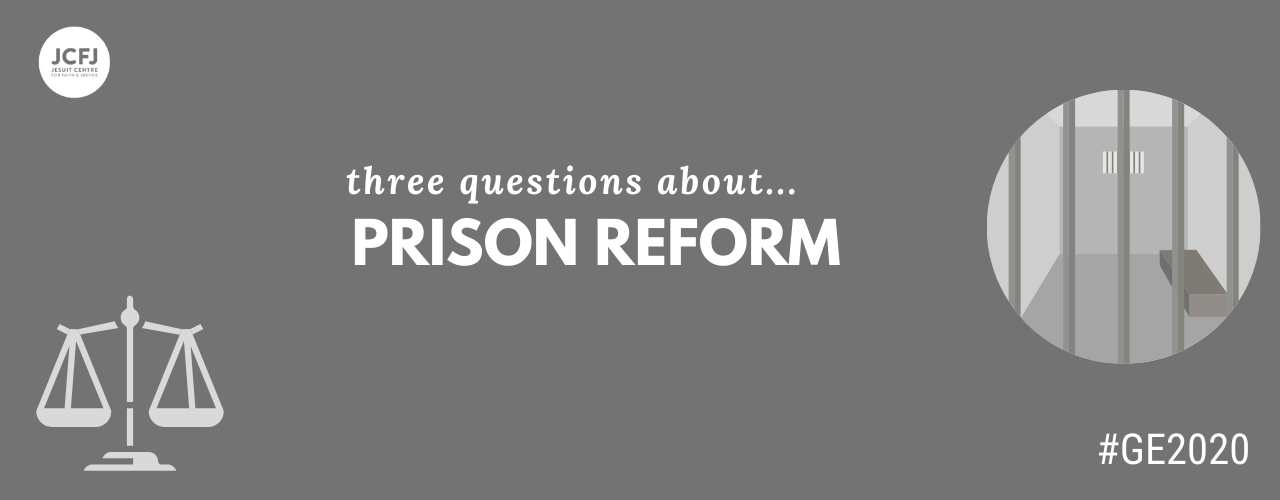
Prison reform is not a topic that is high on the election agenda. However, the inhumane conditions of our prisons and the number of prisoners who come from backgrounds characterised by poverty and trauma should concern us as members of a modern, progressive society.
3 Things You Need to Know
- The number of people within Irish prisons is currently over 4,000. This has been increasing in the past three years and has lead to habitual overcrowding, with an increased frequency of people sleeping on mattresses on the floor. Overcrowding is most serious in the two female prisons with Mountjoy female prison at 132% and Limerick female prison at 158% of capacity.
- The increasing number of women committed to prison is linked to the lack of housing. Housing is key to stability in a person’s life. However, judges are increasingly imposing short sentences of less than three months on women, which causes knock-on difficulties for them to keep their housing. Perversely, on the other side of the prison sentence, people are then being released into homelessness.
- Prison is a damaging experience, even more so for those with mental health illnesses. People with severe mental health needs are still finding themselves in prison. There are typically around 30 prisoners at a time requiring in-patient care waiting on transfer to the Central Mental Hospital for such care. The average waiting time on a transfer is 120 days but this can range from 7 up to 504 days.
3 Things to Ask Yourself
- We are reminded often that we live in a modern, progressive Ireland, which has made a clean break with its institutional past. Yet, why are we institutionalising more and more people each year, often because they are poor or have chaotic lives?
- If people, increasingly women, are receiving short sentences of three months or less for property crimes, what is the likelihood of rehabilitation occuring in that time? Would this rehabilitation not be better in the community?
- Our health service is in crisis. Social care services are seriously under-resourced. Funding for community projects has been slashed and not restored. Is prison a suitable place to meet the needs of those who have been failed by chronic under-investment in our health and social services?
3 Things You Need to Ask Politicians
- Prison numbers are increasing which is leading to acute overcrowding, including prisoners sleeping on mattresses. What is your solution to the overcrowding?
- Okay, a simple yes or no, should a person ever receive a three-month sentence to prison?
- Mental health need within prisons is becoming much more acute and people are at risk of injury or death. Without talking generally about increasing funding, tell me specifically where you would assign funding to meet these needs?
3 Things Politicians Might Say
- “Tough on crime, tough on the causes of crime”
This slogan is not an original political message, rather a re-heating of a 1995 slogan from Tony Blair’s policy for justice reform particularly juvenile crime. In Ireland, it is crafted to appeal to the average home-owning voter who, through years of over-representation of property crime on television and print media, has developed an unrealistic view of the frequency of property crimes. In fact, the number of burglaries committed has decreased in the past year. White-collar crimes which can cause much more damage to communities will not be on the radar for this politician. This message also attributes blame heavily with the individual who commits the crime rather than looking at the underlying reasons for property-related crimes such as poverty, homelessness, under-employment or under-investment in communities. More Gardaí on the streets does not lower crime or reduce numbers in prison. In fact, it can lead to over-policing in certain communities, the detection of low-level crime, thus drawing more people into the criminal justice system. - “We are a party of law and order”
A politician who declares this as their slogan, on issues of criminal justice and prison, will likely envision a future with an increased prison population as less people are diverted away from the criminal justice system but instead receive a custodial sentence. Short sentences are increasingly being given to people for property-related crimes, in fact, women have seen the largest increase in short sentences. Instead of providing rehabilitation or stability, sentences like this, which are often related to poverty, destabilise people’s lives further and disrupt family and social relationships. This position prioritises punishment of the individual above rehabilitation and reintegration to the community. - “Invest in the prison estate”
When politicians talk about investing in the prison estate, it is typically always in relation to increasing capacity. Prisons can be an oddity, in that if spaces are there, they will always be filled. Instead of increasing the capacity of our prisons, we need to reduce the number of needless incarcerations (which cost the state on average almost €70,000 per year) and invest additional monies in prison staff, non-custodial alternatives, addiction support, mental health services, and community projects. If we want a society where crime is reduced, we have to aim for more than just a punitive justice system.

